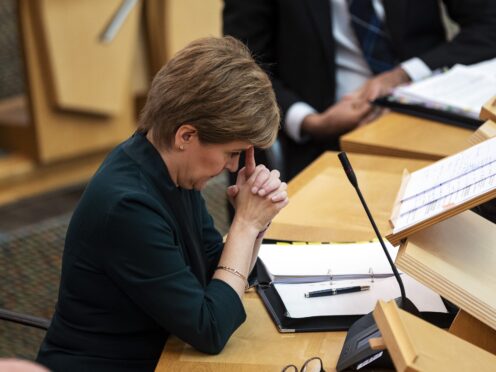Performance in Scotland’s accident and emergency departments is “not good enough”, Nicola Sturgeon has conceded.
After official figures earlier this week showed compliance against the four-hour treatment time target had fallen to the worst level on record, the First Minister was pressed on her Government’s stewardship of the NHS.
Conservative leader Douglas Ross challenged Ms Sturgeon on the issue at First Minister’s Questions in the Scottish Parliament, demanding: “Isn’t it time that the First Minister and her Health Secretary finally got a grip of events?”
The Scottish Government target is for 95% of patients to be treated within four hours, but figures for the week ending September 12 show just 71.5% of A&E patients were seen and subsequently discharged or admitted to hospital within four hours.
Ms Sturgeon said: “The waiting times in our accident and emergency departments are not good enough.
“Around seven out of 10 in the most recent weekly figures being seen within four hours, that is not good enough.
“I hope we will see improvements in that in the coming weeks.”
Mr Ross accused the First Minister of “hiding behind Covid” and blaming the pandemic for the problems within the NHS.
He said the number of people waiting more than 12 hours – half a day – in A&E was now 10 times higher than it had been two years ago.
He added that since 2015, more than 850,000 people had waited longer than four hours in A&E.
Mr Ross said: “Nicola Sturgeon is Scotland’s First Minister, she was Scotland’s health secretary, and I would like her to take some responsibility for what is happening in Scotland’s health service.

“Because Nicola Sturgeon is hiding behind Covid, and it is not all down to the pandemic. Since 2015 more than 850,000 people have waited longer than the four-hour target time at A&E.”
The First Minister told him the number of consultants in A&E was up by 242% since the SNP came to power, but Mr Ross insisted that “gives little comfort” to those patients who have had long waits for treatment.
He also raised the issue of cervical cancer screening, saying the number of checks being carried out for the disease was “a third lower this year compared to the same period in 2019”.
Mr Ross told the First Minister: “This can’t possibly all be blamed on Covid. Of all of the services that should be returning to pre-pandemic levels, this is a vital one.
“Isn’t it the case that the pandemic has completely exposed her Government’s poor record on running Scotland’s NHS?
“Isn’t it the case that the crisis that has spiralled over the past few weeks has shown ministers constantly behind the curve? And isn’t it time that the First Minister and her Health Secretary finally got a grip of events?”
On cervical cancer screening, Ms Sturgeon said: “There has been an impact from Covid on people coming forward for routine healthcare and that will include the screening programmes.”

She also said there were “wider issues around encouraging women to come forward for screening, whether that is cervical screening or breast screening or any of the screening programmes”.
The First Minister told how A&E departments, and the NHS as a whole were “working under intense pressure” – adding this had been “considerably exacerbated because of Covid”.
She said work was going on to ensure more patients are discharged from hospital when they are medically ready to go, as well as increasing bed capacity.
Ms Sturgeon vowed: “We will continue to invest in staff, we will continue to invest in the NHS overall.
“And I would hope, though we are not complacent about this given the pressures we are facing, that we will start to see some improvement in A&E waiting times in the weeks ahead.”
But she also told MSPs that Scotland had “the best performing A&E departments anywhere in the UK, even in these difficult circumstances”, adding this “suggests that the actions we are taking, while they need to go further, are helping”.
